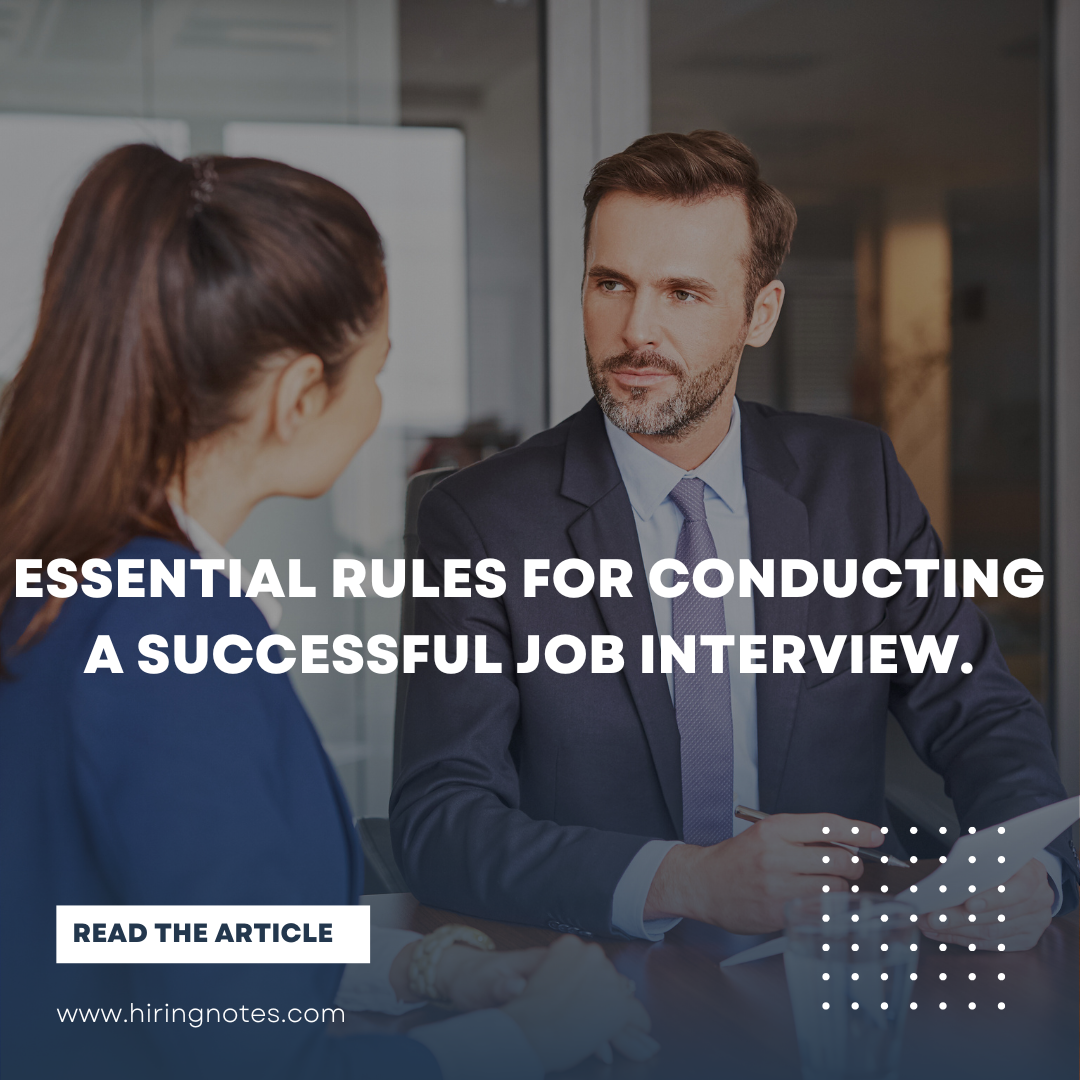Essential Rules for Conducting a Successful Job Interview
- Hiring Notes
- 27, Nov, 2024

Preparing and conducting a job interview is a crucial moment for both the company and the candidate. It's about finding the perfect match for the position while allowing the candidate to assess if the opportunity aligns with their professional ambitions. To achieve this, it's essential to follow key rules and gather all necessary information to guide the recruitment process efficiently and professionally. Helpful advice can also ease this journey.
A successful job interview requires meticulous preparation, attentive conduct, and thorough follow-up. It's crucial to approach each stage of the recruitment process, from the job definition to post-interview follow-up, with the utmost care to ensure a fair and complete evaluation of the candidate's skills, experience, and qualities. Additional advice can also be valuable for the employer in selecting the best candidates. This article offers tips to optimize your interviews, covering preparation, conduct, and follow-up, to maximize your chances of finding the ideal candidate for your company and providing a positive experience for all participants. By integrating the latest recruitment trends and effectively using your networks, you can improve your hiring process and attract motivated candidates.
Preparation for the Job Interview
Understanding the Desired Profile

To conduct a successful job interview, it's crucial to precisely grasp the ideal candidate profile for the position. This involves thoroughly studying the job description, the tasks, and the essential skills required. It's important to identify both the technical skills and the key personal qualities for the role and understand their connection to the company’s objectives and values. Understanding the necessary projects and training can also positively influence recruitment.
This recruitment approach will help you formulate targeted questions and adequately assess whether the candidate's application matches the desired profile. As a recruiter, it's essential to use practical advice to align the selection with the company's needs.
Also, consider the candidate’s professional experiences, qualifications, and past achievements, and be ready to ask for specific examples that highlight their skills, personality, and behaviors in specific contexts. This approach helps understand how the candidate can integrate into the company’s projects and contribute to its success.
Prepare Relevant Questions
Drafting the questions to ask is crucial in interview preparation. These questions should be designed to assess the candidate's skills, experience, and motivations. Adopt a "behavior-focused" approach, which involves asking for concrete examples of past situations where the candidate demonstrated the expected behaviors and skills. It is also recommended to follow the advice of experienced recruiters and to use an interview checklist to ensure important points are not overlooked during the interview.
Consider asking open-ended questions, inviting the candidate to share their experiences and thoughts in detail. For example, ask them to describe a situation where they had to manage stress or a time they were responsible for a project or task. These inquiries will help you evaluate their personality, motivation, and ability to think and act in various situations.
Organize the Interview Space
Arranging the interview space is equally important for both the employer and the candidate. Ensure you choose a quiet, well-lit place free from distractions, creating a professional atmosphere conducive to a constructive exchange.
For video conferencing interviews, make sure the equipment is functional: a stable Wi-Fi connection, quality microphone and headphones, and a well-positioned camera. Moreover, check your networks to ensure smooth communication and avoid any interruptions.
Also, prepare all necessary documents, like the candidate’s resume, the job description, the job offer details, and any other pertinent documents. A well-organized space and a professional atmosphere are essential for fostering a productive and respectful exchange, providing all essential information for the smooth running of the interview.
Conducting the Interview

Establishing a Good First Impression
Welcoming the candidate is an important step in conducting the job interview. It’s essential for the employer to create a welcoming and professional atmosphere to put the candidate at ease and reflect the company’s values.
Start with a respectful and clear introduction of yourself as the recruiter and the company. Briefly explain the interview process, the associated tasks, and the employer’s objectives to establish a clear and reassuring framework.
Make sure the interview location is clean, quiet, and free of distractions. A good welcome contributes to employer branding and motivates the candidate to join the company. A tidy environment reflects the company’s values and strengthens the positive impact of your recruitment process.
Don’t forget to clarify the context of the interview, whether it’s a one-on-one, a panel interview, or a situational interview. This clarification helps the candidate better prepare and understand the recruitment process.
Effective Communication Techniques
To conduct an effective interview, it's vital to use appropriate communication techniques. Let the candidate speak and actively listen to them. Communication tips can help you better understand the candidate’s personality and maintain a professional exchange.
Use reformulation to ensure you’ve understood the candidate’s remarks, demonstrating your professional engagement and interest in what they are saying. This technique improves communication and fosters a better mutual understanding during the interview.
Opt for a semi-structured interview, where you ask questions while adapting to exchanges with the candidate, like in a natural conversation. Avoid questions that are too vague or too open and prioritize behavioral questions that lead the candidate to illustrate their skills and behaviors through concrete examples of past situations. This method allows for a better evaluation of the candidate's professional and personal qualifications.
Ensure to present the position and the company clearly, emphasizing the tasks, expectations, and company values. Also, mention ongoing projects and training opportunities. This helps the candidate project themselves into the role and better understand the working environment.
Managing Interview Time
Time management is crucial for effective interview conduction. Ensure the interview doesn’t exceed 1 to 1.5 hours, respecting the planned stages, even if it means scheduling another meeting to discuss additional topics if necessary. This organization shows your professionalism and respects the candidate’s time.
Divide the interview into distinct phases: an introduction where you and the candidate introduce yourselves, a detailed discussion phase about the candidate’s skills and experiences, and a conclusion where you answer the candidate’s questions and summarize the key points discussed.
Also, leave time for the candidate to clarify any remaining doubts and uncertainties about the job offer and the application.
In conclusion, inform the candidate about the next steps in the recruitment process and the expected response timeframe. This transparency helps maintain a positive relationship with the candidate, regardless of whether they are selected, and reinforces your company’s reputation as a transparent employer.
Post-Interview Follow-Up

Evaluating the Candidate's Responses and Behaviors
After the interview, it is crucial to conduct a detailed evaluation of the candidate's responses and behaviors. This step is essential to determine if the candidate meets the expectations of the desired profile by verifying the alignment of their skills, experience, and personal qualities with the job requirements.
Review the notes taken during the interview and assess the candidate's strengths and weaknesses. This detailed analysis will help you make an informed decision in the recruitment process.
Compare the candidate’s responses to the established selection criteria. It is also beneficial to seek feedback from other team members who participated in the interview to gain a comprehensive and objective perspective on the candidate within the recruitment process.
Consider how the candidate interacted with you and other team members. Adaptability, communication, personality, and teamwork ability are important criteria. This comprehensive evaluation is critical for making an informed decision about the continuation of the recruitment process.
Decision and Feedback to the Candidate
After the evaluation, it is time to make a decision regarding the application. Also, consider logistical aspects like the candidate’s residential distance from the workplace. If the candidate is selected, inform them promptly of the next steps, such as signing the employment contract, start date, and integration details within the company.
If the candidate is not selected, provide them with constructive feedback. This can be done by email or phone, explaining the reasons for the decision. This feedback is valuable for the candidate, allowing them to improve their performance for future interviews, and demonstrates your respect for their time invested in your recruitment process.
Maintain professional and respectful communication, thereby contributing to a positive image of the company and keeping good relations with candidates. Such an approach strengthens your employer brand and promotes an effective recruitment process.
Preparing the Integration of the New Employee
The careful integration of the chosen candidate is essential. Begin by preparing the necessary documents, like the employment contract, enrollment forms, and employer manuals.
Organize a welcome session to introduce the new employee to the team, provide information on their role, responsibilities, and company expectations. Thoroughly explain the tasks and projects they will participate in. Ensure that the necessary equipment is ready and functional to facilitate their integration.
Assign a mentor or an experienced colleague to accompany the new member during their initial weeks, facilitating their adaptation through continuous training and answering their questions. This approach promotes successful integration, aligning the new employee with company values and strengthening team cohesion.
Conclusion
In conclusion, successful job interviews rely on meticulous preparation, attentive conduction, and rigorous follow-up. It is essential to clearly understand the candidate profile, craft relevant questions, and arrange a conducive interview space. By following these tips at every step of the recruitment process, you increase your chances of success.
During the interview, making a good first impression, employing effective communication techniques, and managing time optimally are crucial. These practices enhance the recruitment process's efficiency and ensure a positive experience for the candidate.
Post-interview, evaluating the candidate's responses and behaviors, making an informed decision, and providing constructive feedback are crucial phases of the recruitment process. Carefully preparing the new employee’s integration is also beneficial for their success and that of the company.